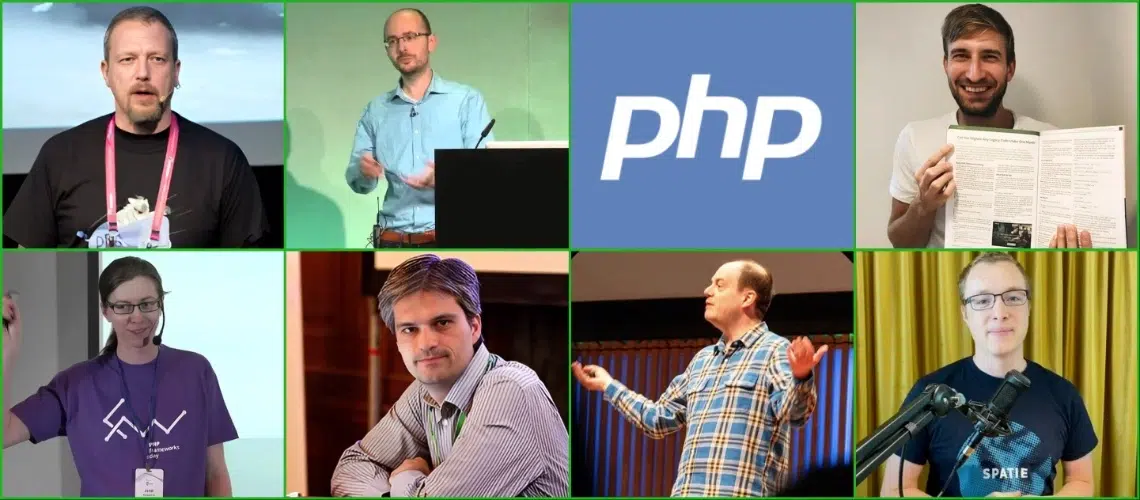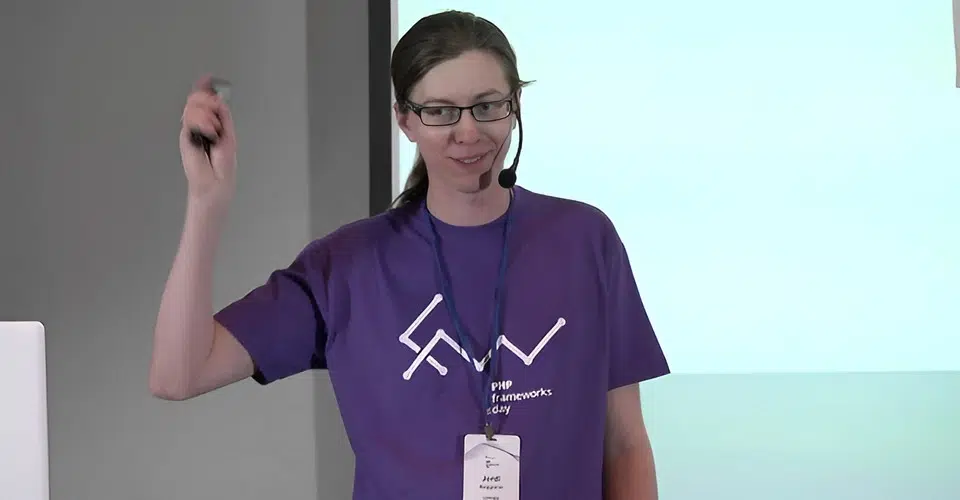Top PHP Developers – 22 Elite Pros

PHP has powered the web for over two decades and its ecosystem continues to thrive thanks to a passionate global community of exceptional developers.
This includes creators of foundational tools such as Composer and PHPUnit, startup founders who still contribute code daily, influential bloggers and educators, core contributors and leaders shaping frameworks such as Symfony and Laravel. Below is a curated list of some of the most impactful and active PHP developers today, individuals whose code, vision, and mentorship continue to elevate the PHP landscape for millions of developers worldwide.
- Sebastian Bergmann
- Nils Adermann
- Fabien Potencier
- Dries Vints
- Jakub Vrana
- Jordi Boggiano
- Derick Rethans
- Ondřej Mirtes
- Tomáš Votruba
- Marco Pivetta
- Benjamin Eberlei
- Brent Roose
- Joe Watkins
- Kévin Dunglas
- Matthias Noback
- Paweł Jędrzejewski
- Alain Schlesser
- Michelangelo van Dam
- Juliette Reinders Folmer
- Abdullah Shakir
- Lukas Kahwe Smith
- Anthony Ferrara
Now, let’s delve deeper into their qualifications and achievements:
Sebastian Bergmann

Nationality: German
Sebastian is the creator of PHPUnit, the industry-standard testing framework that has significantly advanced the professionalism of PHP software development.
As co-founder of The PHP Consulting Company, he shares his expertise through books, presentations, and podcasts, helping teams adopt better testing and development practices. Sebastian also played a key role in establishing the PHP Foundation to support PHP’s core development, and he continues to maintain PHPUnit and mentor the community as one of PHP’s foremost testing experts.
- Linkedin: Sebastian Bergmann
- Github: sebastianbergmann
- Website/Blog: sebastian-bergmann.de
Nils Adermann
Nationality: German
Nils co-created Composer alongside Jordi Boggiano, revolutionizing PHP package management, and co-founded Private Packagist to provide enterprise package repository services.
With over a decade of open-source contributions, Nils has helped solve the dependency problems PHP developers faced and improve their workflow. He remains a core maintainer of Composer and an advocate for better developer experience in PHP, frequently speaking about security and best practices in package management.
- Linkedin: Nils Adermann
- X (Twitter): @naderman
- Github: naderman
- Website/Blog: naderman.de
Fabien Potencier

Nationality: French
Fabien is the creator of the Symfony framework – one of the world’s most widely used PHP frameworks – and a serial entrepreneur in the PHP ecosystem.
He co-founded SensioLabs (the company behind Symfony) and later founded Blackfire.io (a performance profiling tool acquired by Platform.sh). Fabien’s decades of experience and technical vision have made Symfony a cornerstone of modern PHP development, and he remains a globally recognized leader and innovator in the community.
- Linkedin: Fabien Potencier
- X (Twitter): @fabpot
- Github: fabpot
Dries Vints
Nationality: Belgian
Dries is a software engineer from Belgium who has been a core team member of the Laravel framework. At Laravel, Dries maintained numerous open-source projects and handled the weekly framework releases.
He is the creator of Blade UI Kit (a collection of UI components for Laravel Blade) and was the long-time maintainer of Laravel.io, the Laravel community forum. Dries also co-organizes Full Stack Europe and previously ran the PHP user group in Belgium. Recently, he founded Eventy, an online platform for tech conferences and meetups, reflecting his passion for community.
Through code and community work, Dries has significantly shaped the Laravel ecosystem and continues to build tools that bring developers together.
- Linkedin: Dries Vints
- X (Twitter): @driesvints
- Github: driesvints
Jakub Vrana
Nationality: Czech
Jakub is the creator of Adminer, a lightweight database management tool written in PHP that consists of only a single PHP file.
Adminer, which Jakub launched as an alternative to phpMyAdmin, supports numerous databases and has gained a following for being efficient and easy to deploy. Jakub also developed the early PHP ORM library NotORM. His work on Adminer (and various database tools) has provided PHP developers with simpler ways to interact with databases.
Jakub later joined Google as a software engineer, but he continues to maintain Adminer as an open-source project that showcases the power of simplicity in PHP.
- Linkedin: Jakub Vrana
- X (Twitter): @jakubvrana
- Github: vrana
- Website/Blog: vrana.cz
Jordi Boggiano

Nationality: Swiss
Jordi is best known as the co-author of Composer, PHP’s dependency manager, and the Packagist package repository.
He has been maintaining Composer and Packagist for years, enabling modern PHP development by simplifying package management. Jordi co-founded Private Packagist (a company offering Composer package services) and continues to lead engineering efforts there. An active open-source contributor, Jordi’s work has shaped the way PHP developers manage and share code, making him a key figure in the PHP community.
- Linkedin: Jordi Boggiano
- X (Twitter): @seldaek
- Github: Seldaek
Derick Rethans
I’ve always believed PHP developers deserve proper debugging tools. Xdebug exists to make the invisible visible — because understanding your code matters.
Nationality: Dutch
Derick is a PHP internals expert best known as the creator of Xdebug, the widely used debugging and profiling extension for PHP.
He has been contributing to PHP core for years (including maintaining the date/time extension) and is a release manager for PHP 7.4. Derick’s work on Xdebug has vastly improved PHP developers’ ability to troubleshoot code, and he remains actively involved in PHP’s development as part of the PHP Foundation.
A frequent speaker and podcaster, Derick continues to share his deep knowledge of PHP internals with the community.
- Linkedin: Derick Rethans
- X (Twitter): @derickr
- Github: derickr
- Website/Blog: derickrethans.nl
Ondrej Mirtes
Nationality: Czech
Ondřej is the creator of PHPStan, a popular open-source static analysis tool that finds bugs in PHP code without running it.
PHPStan has transformed how developers ensure code quality, catching errors early and encouraging type-safety practices. Ondřej maintains PHPStan full-time and has grown it into an ecosystem with numerous extensions. Through conference talks and blogs, he advocates for writing robust PHP code.
His work has made static analysis a standard part of modern PHP development, significantly improving code reliability.
- Linkedin: Ondřej Mirtes
- X (Twitter): @OndrejMirtes
- Github: ondrejmirtes
Tomas Votruba

Nationality: Czech
Tomáš is an open-source developer known for creating Rector, an automated refactoring tool that can upgrade and improve PHP codebases.
He also founded the Pehapkari PHP community in the Czech Republic. Tomáš’s work on Rector (and prior contribution to coding standards tools) helps thousands of developers keep their PHP code modern and consistent. A frequent speaker and blogger, Tomáš is passionate about connecting developers – he co-organizes the PHPers meetups – and about making continuous improvement of legacy code accessible through automation.
- Linkedin: Tomáš Votruba
- X (Twitter): @votrubaT
- Github: TomasVotruba
Marco Pivetta
Nationality: Italian
Marco is a highly respected PHP consultant and open-source contributor.
He is a core team member of the Doctrine Project, maintaining the Doctrine ORM and related libraries that power database interactions in many enterprise PHP applications. Marco has also contributed to the Zend Framework (now Laminas) as part of its Community Review team.
A champion of clean code and best practices, he is a frequent conference speaker and is revered in the community for his deep knowledge of PHP architecture and performance tuning.
- Linkedin: Marco Pivetta
- X (Twitter): @Ocramius
- Github: Ocramius
Benjamin Eberlei
Nationality: German
Benjamin is the founder of Tideways (a PHP performance monitoring and profiling company) and a long-time core contributor to Doctrine ORM.
He created the Doctrine “Migrations” library and has driven performance improvements in PHP applications through both his open-source work and his company’s tooling. Benjamin also contributed to PHP itself (for example, he proposed and implemented the “Attributes” feature in PHP 8). As an active open-source maintainer and podcaster, he’s dedicated to making PHP applications faster and more reliable.
- Linkedin: Benjamin Eberlei
- X (Twitter): @beberlei
- Github: beberlei
Brent Roose

Nationality: Belgian
Brent is a developer advocate for PHP at JetBrains (the company behind PhpStorm) and an influential blogger known for his site stitcher.io.
Active in the PHP community for over a decade, Brent has a well-known blog and newsletter called Stitcher where he writes about modern PHP features and practices. He authored the book “Laravel Beyond CRUD” and built open-source tools like Exposé. Brent also hosts the PHP Annotated show on YouTube and co-organizes meetups, bridging the gap between the PHP core development and everyday developers.
His work helps developers discover the latest PHP innovations and adopt best practices in their projects.
- Linkedin: Brent Roose
- X (Twitter): @brendt_gd
- Github: brendt
Joe Watkins
Nationality: British
Joe is a PHP core developer who has expanded PHP’s capabilities in areas like threading and debugging. He is the author of pthreads (the first multi-threading API for PHP) and the creator of PHP’s built-in debugger phpdbg, which he led as project maintainer.
Joe also maintains the APCu extension (user cache) and has contributed to extensions like PHP-FFI and Parallel that push PHP beyond its traditional limits. His low-level contributions have enabled things once thought impossible in PHP. Joe is known for his “no-nonsense” expertise on internals, and he shares that knowledge selectively on forums and through Patreon, helping the community tackle advanced performance and concurrency challenges.
Kevin Dunglas
Nationality: French
Kévin is an open-source innovator in the PHP world, known for creating API Platform – a popular framework for building API-driven applications in PHP.
He is the founder of the cooperative Les-Tilleuls.coop and has developed cutting-edge projects like Mercure (a real-time push hub for HTTP) and Vulcain (an HTTP/2 caching protocol). Recently, Kévin introduced FrankenPHP, a new PHP application server that embeds PHP in Go, showcasing his knack for pushing boundaries. As a Symfony core team member, he’s contributed several components to Symfony as well.
Kévin frequently speaks at conferences (Laracon, ForumPHP, etc.), sharing his vision of modern, API-first PHP and inspiring developers to adopt the technologies he’s pioneered.
- Linkedin: Kévin Dunglas
- X (Twitter): @dunglas
- Github: dunglas
- Website/Blog: dunglas.dev
Matthias Noback

Nationality: Dutch
Matthias is a software architect, consultant, and author who has been sharing his PHP expertise for nearly 20 years.
He writes extensively on his blog about software architecture, object design, and Domain-Driven Design in PHP, and he’s written acclaimed books like Object Design Style Guide and Advanced Web Application Architecture. Matthias also provides training and workshops across Europe, helping teams adopt better design practices.
He is respected for his thoughtful approach to building maintainable PHP applications and has influenced many developers through his writing and speaking.
- X (Twitter): @matthiasnoback
- Github: matthiasnoback
- Website/Blog: matthiasnoback.nl
Pawel Jedrzejewski
Nationality: Polish
Paweł is the founder of Sylius, an open-source e-commerce framework for PHP (built on Symfony) that has gained global popularity for its flexibility.
He started Sylius as a teenager and grew it into a company and community. Today Sylius is a leading solution for PHP e-commerce sites. Paweł is a passionate open-source advocate – he speaks at conferences about Sylius and open-source sustainability, and he co-organizes PHPers meetups in Poland. Under his guidance, Sylius has become a successful example of a startup founder staying deeply involved in coding.
Paweł’s entrepreneurial journey and community contributions have made him one of Europe’s prominent PHP founder-developers.
- Linkedin: Paweł Jędrzejewski
- X (Twitter): @pjedrzejewski
- Github: pjedrzejewski
Alain Schlesser
Nationality: German
Alain is a senior PHP engineer and the maintainer of WP-CLI, the official command-line interface for WordPress. Based in Germany, Alain has 25+ years of software experience and is a respected voice in the WordPress and PHP communities.
Through WP-CLI, he enables developers to script and automate WordPress tasks at scale, dramatically improving workflows. Alain is also a WordPress Core Contributor and a frequent speaker/trainer on topics like performance and automation (often dubbed the “WP-CLI wizard”). His work demonstrates how PHP developers can empower large user bases (like WordPress admins) with robust developer tools.
- Linkedin: Alain Schlesser
- X (Twitter): @schlessera
- Github: schlessera
Michelangelo van Dam

Nationality: Belgian
Michelangelo is a veteran PHP consultant and community leader from Belgium who has been working with PHP since 2001.
He co-founded the PHPBenelux user group and conference, nurturing an entire region’s PHP community. Michelangelo, often nicknamed the “elePHPant shepherd”, is a true PHP evangelist who mentors developers and promotes best practices. He’s also a Zend Certified Engineer and was heavily involved in Zend Framework early on.
As a frequent speaker and organizer, Michelangelo’s enthusiasm for PHP has inspired many, and he remains a guiding figure especially in the Benelux developer scene.
- Linkedin: Michelangelo van Dam
- Website/Blog: michelangelovandam.com
Juliette Reinders Folmer
Nationality: Dutch
Juliette is a PHP developer and consultant renowned for her work on coding standards and developer tools.
She co-authored the PHPCompatibility project (which helps sniff out deprecated code for new PHP versions) and initiated PHPUnit Polyfills to ease cross-version testing. Juliette also created PHP Cheatsheets, a handy documentation resource. As an active member of PHPWomen and a frequent conference speaker, she advocates for diversity and quality in coding.
Her contributions (often under the alias “@JRF”) to PHP_CodeSniffer rulesets and WordPress core have helped countless developers write cleaner, future-proof PHP code.
- Linkedin: Juliette Reinders Folmer
- X (Twitter): @JRF_nl
- Github: JRFnl
Abdullah Shakir
Nationality: Pakistani
Abdullah is a full-stack engineer focusing on PHP and Laravel, where he builds SaaS backends, REST APIs, and Vue.js front-ends on AWS infrastructure.
He shares guidance on the PHP roadmap, including his LinkedIn Pulse article, “PHP 9 is coming—what should developers expect?”, aimed at helping developers prepare for upcoming changes. In client work he emphasizes performance tuning, clean architecture, and scalable multi-tenant systems—exemplified by the 10X Events platform built on Laravel.
His toolkit centers on modern PHP (8+), Laravel 12, PostgreSQL/MySQL, Docker, and queueing on AWS (e.g., SQS), reflecting production-hardened PHP practices.
- Linkedin: Abdullah Shakir
Lukas Kahwe Smith
Nationality: Swiss/German
Lukas is a well-known open-source contributor and community organizer in the PHP world. A former release manager for PHP 5.3, Lukas helped shape PHP’s release process and contributed to core improvements.
He was a key contributor to Symfony (and led the Symfony Diversity Initiative) as well as to Doctrine ORM. Lukas co-founded the Swiss web agency Liip and more recently co-founded Witty Works, serving as CTO. Throughout, he has remained active in community efforts – from PHP-FIG to user groups – advocating for inclusive, modern PHP development.
His long track record in PHP earned him a reputation as an elder statesman who’s still driving the language and ecosystem forward.
- Linkedin: Lukas Kahwe Smith
- X (Twitter): @lsmith
- Github: lsmith77
Anthony Ferrara
Nationality: American
Anthony is a PHP developer known for practical security work and for influencing how PHP applications handle password hashing. He authored the PHP RFC that introduced the simplified password hashing API (“password_hash“), which was implemented into PHP and became the default approach many teams use for safe password storage.
He has also published and maintained open-source password hashing libraries and educational material focused on secure application development. Anthony’s contributions sit at the intersection of PHP internals process (RFCs) and everyday engineering, improving security defaults for a huge number of PHP codebases.
- Linkedin: Anthony Ferrara
- Github: ircmaxell
Wrap Up
These experts represent exceptional talent, making them extremely challenging to headhunt. However, there are thousands of other highly skilled IT professionals available to hire with our help. Contact us, and we will be happy to discuss your hiring needs.
Note: We’ve dedicated significant time and effort to creating and verifying this curated list of top talent. However, if you believe a correction or addition is needed, feel free to reach out. We’ll gladly review and update the page.
Frequently Asked Questions
Yes, PHP is still relevant. It powers a large share of the web, including WordPress, Drupal, and many custom applications. Modern frameworks like Laravel and Symfony have kept PHP competitive for web development.
In the United States, PHP developers typically earn $75,000 to $110,000 per year. Hourly contract rates range from $35 to $70 depending on experience and project scope. Rates in Eastern Europe and Latin America are usually lower.
A PHP expert should have strong knowledge of frameworks such as Laravel or Symfony, experience with databases like MySQL, and skills in building secure, scalable web applications. Familiarity with CMS platforms (WordPress, Magento) can also be valuable.
You can hire PHP developers through IT staffing agencies, freelance platforms like Upwork and Toptal, or specialized job boards for web developers. Large PHP communities also make it easier to source talent directly.
PHP is used by companies such as Facebook (in its early years, with evolved internal frameworks), Wikipedia, Slack, and Mailchimp, along with countless small and mid-sized businesses.
